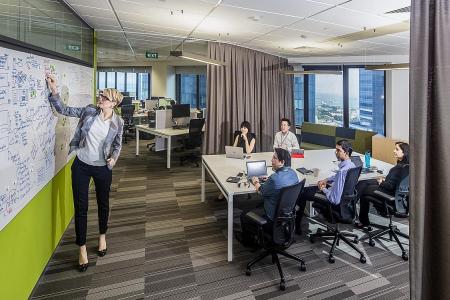How to build strong work ethic among employees
Fostering an excellent work ethic is critical in any organisation because seemingly small lapses could have a huge impact and affect many people and tarnish your company's reputation.
But how do you infuse a spirit of personal responsibility in each employee?
It boils down to inculcating a sense of individual pride in work and fostering good work habits. Here is some advice for human resources managers to work with management to roll out.
ROOT OUT LAXITY
Everyone, from the junior employee to the boss, must be vigilant in his work.
Line managers must supervise and see that the correct processes are carried out at each critical step.
Conduct spot checks if necessary and ensure that no corporate cliques are formed.
What each person does - or does not do - matters. Not only to his pocket but to the company's bottom line and to its customers.
SOW SEEDS OF TRUST
If a genuine mistake has been made, dissect the error. But do so for learning purposes. Avoid a witch-hunt.
Also, team leaders must take responsibility. Letting the little guy take the fall is demoralising.
Ensure that everyone understands why the lapse happened and how to avoid a repeat. Then let team members move on and build trust.
Communicate clearly that cover-ups will not be tolerated. Indicate the proper steps or avenue that employees should take to report a co-worker's unethical behaviour or a possible safety breach.
GIVE CREDIT WHERE IT'S DUE
Managers and line supervisors should never take credit for their employees' work. Those at supervisory levels need to realise that their staff's good work reflects on them.
PLAN FOR PRODUCTIVE DAYS
Have a clear to-do list. Schedule tasks in apps and set up alerts to remind you when a key assignment is due.
Work-life balance is key, but there are times when 10-hour days are necessary.
MIND THE TIME
No one can work non-stop but watch the wasted moments.
These include half-hour gossips at the water cooler, frequent long lunches or scheduling personal errands during office hours - especially if you get off work on the dot.
Your actions impact others. Ensure, for instance, that you always prepare for a meeting and appear on time. If most people turn up with poor ideas, it could mean another meeting, which is unproductive.
The open concept in today's offices makes interaction easy. But it may also mean more interruptions from co-workers.
Set specific times for your colleagues to discuss work with you.
TOUCH BASE FACE TO FACE
E-mail is fine but nothing beats going up to a colleague to talk through cross-functional plans.
For teams working at different locations, there is always the video chat.
Invest in co-worker time. For example, schedule a working lunch or coffee with your peers in a project team to discuss issues.
This article was contributed by Right Management (www.rightmanagement.sg), the global career experts within United States-listed HR consulting firm, ManpowerGroup.
Get The New Paper on your phone with the free TNP app. Download from the Apple App Store or Google Play Store now



